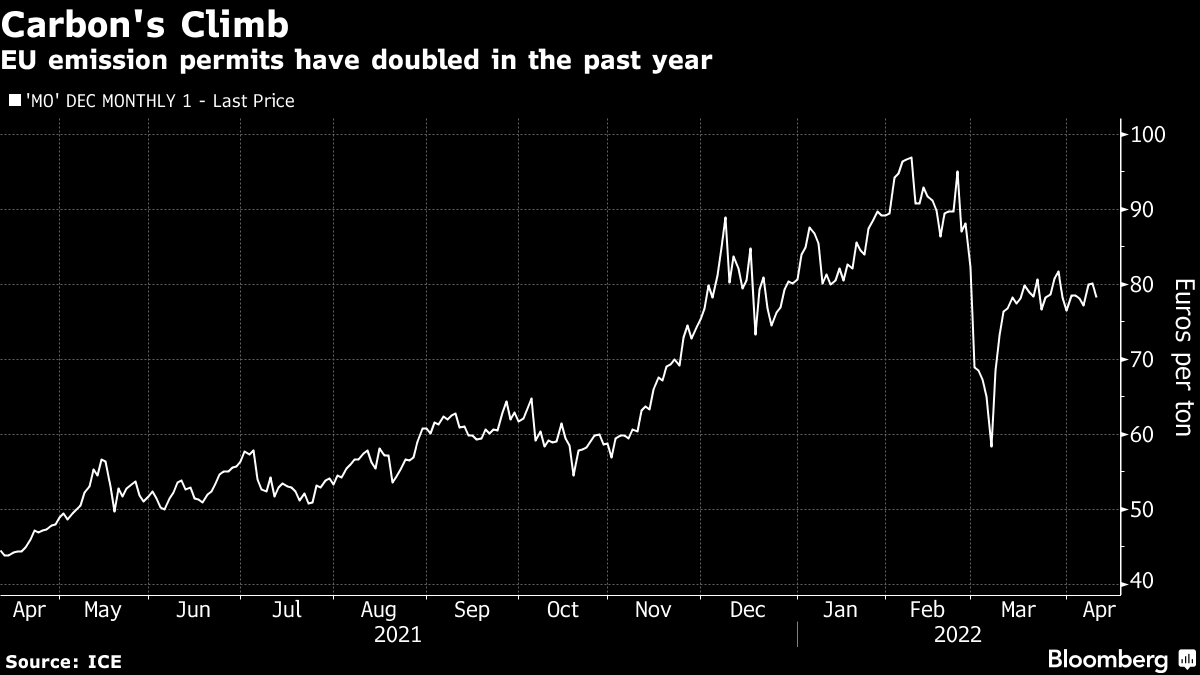War Requires Rethink of EU Carbon Reform, Market Architect Says
(Bloomberg) -- The deepest overhaul of the European Union’s carbon market should be adapted to the drastically changed energy landscape caused by Russia’s invasion of Ukraine, according to Jos Delbeke, a key architect of the bloc’s cap-and-trade system.
European governments and the EU Parliament are currently negotiating a set of climate and energy reforms to implement a tougher emissions-reduction goal for 2030. Some elements, such as limiting the supply of pollution rights, need revising because the upheaval to natural gas and coal markets due to the war is likely to stay for longer than thought, Delbeke said in an interview.
“What we need above all is an orderly low-carbon energy transition,” said Delbeke, a former senior official at the European Commission and currently professor at the European University Institute in Florence. “Given the new situation related to gas, a higher use of coal in the energy mix can be expected in the short term, and this will lead to a higher demand of carbon allowances.”

The EU Emissions Trading System is the region’s flagship policy tool to reach climate neutrality by the middle of the century. It imposes shrinking pollution limits on almost 12,000 facilities owned by power producers, manufacturers and airlines and is set to expand into shipping. Permits are mostly sold at government auctions or given to companies for free.
The proposed overhaul helped boost carbon prices to a record 98.49 euros ($107) per metric ton earlier this year, threatening the competitiveness of energy-intensive companies amid soaring gas prices. The reform includes extending tougher rules of a special market reserve to control the supply of permits, the invalidation of some allowances it takes in and a one-off cancellation of emission rights.
“These three elements limit the immediate supply of allowances and may create or exacerbate carbon price hikes,“ Delbeke said. “We should maintain the overall ETS ambition level, which is a 61% reduction of emissions by 2030 from 2005 levels, but we should spread the effort equally over that period, and not concentrate the biggest emission reduction in the coming one or two years.”
Fast Track
The EU Parliament cast its first vote on the carbon market overhaul last week, backing a fast-track proposal to bolster the Market Stability Reserve. The assembly endorsed the Commission’s proposal to extend until 2030 the MSR’s intake rate of 24% -- the percentage of carbon permits taken into the reserve from the market -- which is double the original amount.
Read more: EU States Want Faster Green Talks to Cut Russian Energy Reliance
Separately, it will vote on other elements of the ETS reform in the coming months. Peter Liese, a German lawmaker steering the overhaul through the assembly, is currently working on so-called compromise amendments that could be backed by a majority of members on the environment committee.
Should the Commission proposal be implemented in full, carbon prices would rise to about 130 euros a ton by 2030, according to the CAKE Center for Climate and Energy Analyses think-tank in Poland. The cost of pollution may increase to nearly 200 euros if companies increase purchases of permits to cover their emissions.
Delbeke said the current price at around 79 euros was “useful” as it encourages new low-carbon technologies into the market.
“Continuing a price within the range of 60-90 euros, without much volatility outside this range, is what we should hope for,” he said. “This will significantly help to make the EU economy low in carbon and at the same time much more resilient as far as energy is concerned.”
More stories like this are available on bloomberg.com
©2022 Bloomberg L.P.





